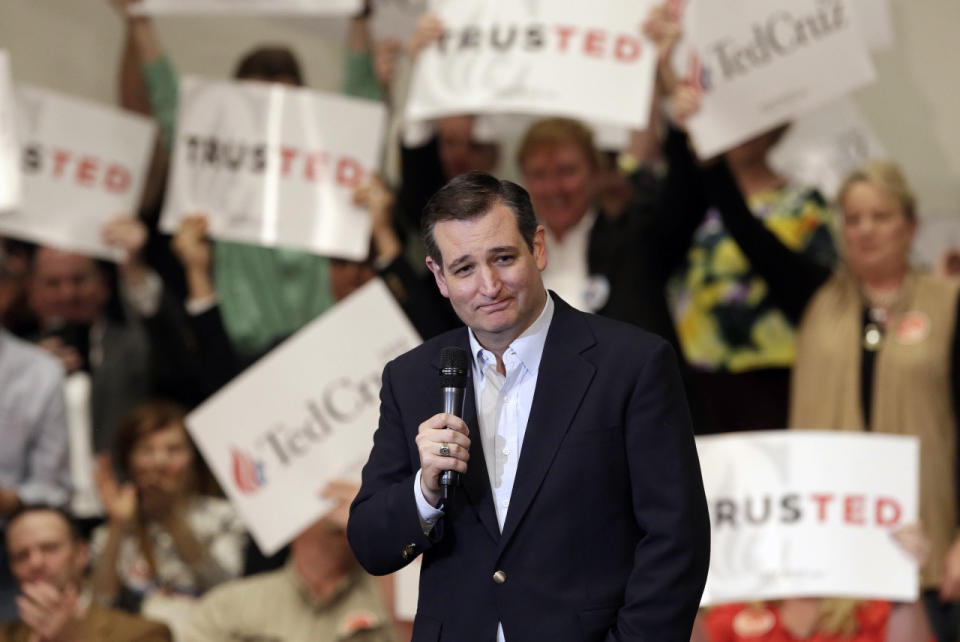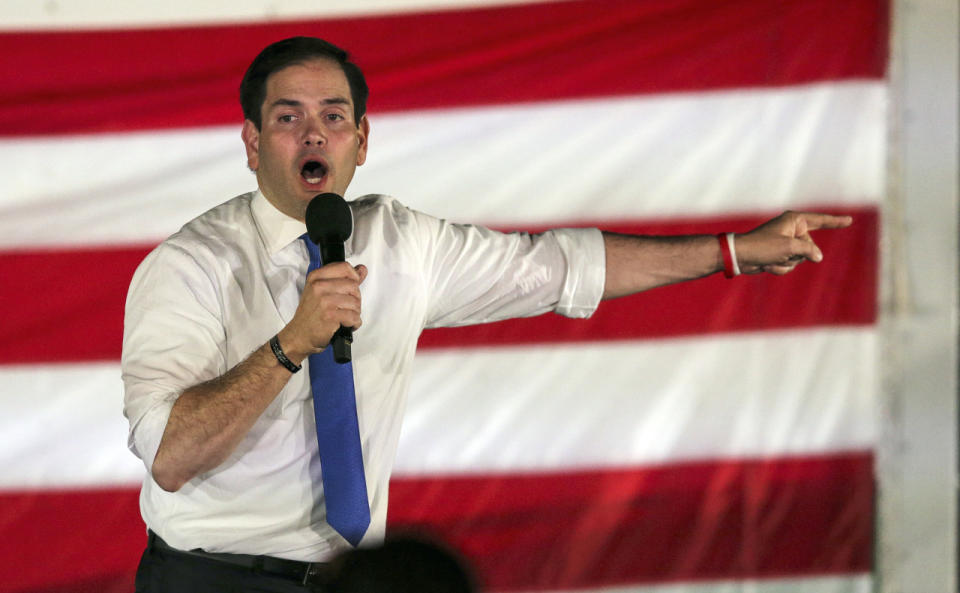Trump romps in Michigan and Mississippi, tightening his grip on the nomination
JUPITER, Fla. — Donald Trump advanced his lead in the race for the Republican presidential nomination, winning Mississippi and Michigan, the biggest states up for grabs Tuesday in the increasingly bitter GOP primary contest. Later in the evening, he also scored a victory in the Hawaii caucuses. Meanwhile, Texas Sen. Ted Cruz, vying to make it a one-on-one race with Trump, won Idaho.
Unlike last week’s Super Tuesday contests, just 150 delegates were up for grabs Tuesday — and all were awarded proportionally, suggesting that the results would not dramatically alter the current standing of the GOP race, where Trump enjoys a healthy lead over Cruz, Sen. Marco Rubio of Florida and Gov. John Kasich of Ohio.
But for Trump, Tuesday’s wins were a significant psychological victory for his insurgent campaign, affirming that he retains his momentum even after days of withering attacks from rivals and members of a Republican establishment newly determined to derail his bid for the party’s nomination.
“I don’t think I have ever had so many horrible things said about me in one week,” Trump said at an election night press conference here.
Referring to an onslaught of negative ads from his rivals and super-PACs, he added, “$38 million of horrible lies. … It shows you how brilliant the public is, because they knew they were lies.”

Donald Trump speaks at Trump National Golf Club in Jupiter, Fla., on Tuesday. (Photo: Joe Skipper/Reuters)
In Mississippi, Trump was projected to win by double digits, in spite of a last-minute endorsement of Cruz by Phil Bryant, the state’s governor. Exit polls showed that Trump won thanks to not only the support of early voters, but also thanks to Republicans who waited until the last minute to select their candidate.
And in Michigan, Trump easily triumphed in a win fueled by working-class voters angry at the federal government and politicians in Washington. According to exit polls, more than half of Michigan Republicans said they wanted the next president to be “someone outside the political establishment.”
But Trump’s victories Tuesday also came at a time when election results and polling, both nationally and in states holding primaries and caucuses, suggest he is losing at least some altitude in the race. Last Saturday, Cruz claimed victories in Kansas and Maine — states where Trump had been favored — and in recent days, the Texas senator has pulled closer in many polls. This has given hope to party members pouring millions of dollars into super-PAC ads attacking Trump that their attacks are slowly working.
But it’s still unclear if Cruz’s rise has been fueled by the consolidation of anti-Trump sentiment or the real estate mogul’s missteps on the campaign trail, including his off-color commentary at last week’s GOP debate, which did not sit well with some voters.
During that debate, Trump boasted about the size of his genitals, refused to disclose whether he’s waffled in private about opposing illegal immigration and showed no ability to answer detailed questions from Fox News’ Chris Wallace about how to reduce the budget deficit. The overall acrimony of the night led one pundit to call it “a low point not just in the history of American democracy, but democracy itself.”

Sen. Ted Cruz addresses a campaign rally at Central Baptist Church in Kannapolis, N.C., on Tuesday. (Photo: Gerry Broome/AP)
But in many ways, Trump appears to be surviving — if not thriving on — attacks from fellow Republicans determined to derail his campaign. Mitt Romney, the party’s 2012 nominee, has repeatedly denounced Trump as a “phony” and called on Republican voters to oppose him.
On Monday, Republicans in Florida and Michigan began receiving get-out-the-vote robocalls featuring Romney. Though Romney has not formally endorsed a candidate (and says he won’t until after March 15, when Ohio and Florida voters head to the polls), Romney robocalls in Florida urged Republicans to back Rubio, while his Michigan calls promoted Kasich.
The calls appeared to make little difference in Michigan, Romney’s home state. They also did not seem to give the Ohio governor the momentum he desperately needs heading into his home state primary next week, where Trump leads, according to early polls, and where he plans to campaign heavily in coming days.
The spotlight now shifts to Florida, where Rubio is fighting to stay alive in a race where he is increasingly losing support and momentum. On Monday, Trump, who holds a double-digit lead in Florida in some polls, unveiled a rare television ad attacking Rubio, which his campaign says it will air in Florida before next week’s primary.
At the same time, Cruz has suggested he will also take aim at Rubio in Florida, in hopes of driving his fellow senator out of the race. Last week, the Texas senator opened 10 campaign offices across the state, and he’s scheduled to campaign in the state in coming days, even though he has no chance of actually winning Florida. That’s a potentially risky strategy for Cruz, in that it has him taking away time and attention from other voting states, like North Carolina and Illinois, where he is also hoping to inch up the nomination board delegate by delegate.

Sen. Marco Rubio addresses a campaign rally in Ponte Vedra Beach, Fla., on Tuesday. (Photo: Gary McCullough/AP)
Coming into the night, Trump had 391 delegates, Cruz had 303, Rubio had 152 and Kasich had 37. If Rubio can win his home state of Florida next Tuesday, then he, Cruz and Kasich will all have a case for staying in the race, which could lead to a contested convention in July, since no candidate would be likely to net the 1,237 delegates required to secure the nomination.
On Tuesday, Trump stopped short of calling on Rubio to quit the race, as he did last Saturday. But he did call on Republicans to stop trying to derail his campaign and to get behind his candidacy in order to focus the party’s aim on Hillary Clinton this fall — even those in the party, like Romney, whom he’s sparred with.
“I say, let’s come together,” Trump said. “Believe it or not, I’m a unifier. I unify.”

